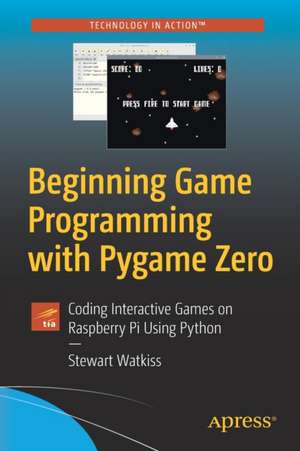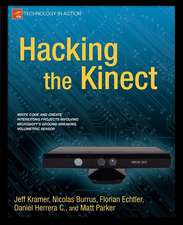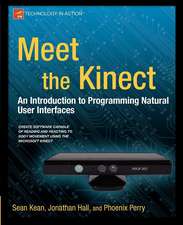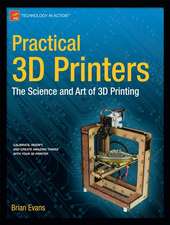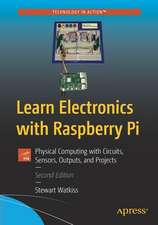Beginning Game Programming with Pygame Zero: Coding Interactive Games on Raspberry Pi Using Python
Autor Stewart Watkissen Limba Engleză Paperback – 5 feb 2020
Start with a simple text based game to grasp the basics of programming in Python. Then moves on to creating simple graphical games in Pygame Zero. Not only will you learn object oriented programming to make it easier to make more complex games, you'll also work to create your own graphics and sounds. 3D graphics are a little complex. So we focus on 2D games, including spins on some classic boardgames and arcade games. All the games are designed to run on a Raspberry Pi. They will work on any Raspberry Pi, butwill also work on any other computer that supports Python 3 along with Pygame Zero.
The games you make will be playable and hopefully fun to play. And by the end of the book, you can step beyond the provided source code to develop your own unique games and programs.
What You'll Learn
- Code in Python
- Generate sounds and graphics for 2D games
- Grasp object oriented programming with Pygame Zero
Who This Book Is For
Beginning game developers interested in working with low-cost and easy-to-learn solutions like Pygame Zero and the Raspberry Pi.
Preț: 323.04 lei
Preț vechi: 403.80 lei
-20% Nou
Puncte Express: 485
Preț estimativ în valută:
61.82€ • 67.13$ • 51.93£
61.82€ • 67.13$ • 51.93£
Carte tipărită la comandă
Livrare economică 19-25 aprilie
Preluare comenzi: 021 569.72.76
Specificații
ISBN-13: 9781484256497
ISBN-10: 1484256492
Pagini: 348
Ilustrații: XX, 348 p. 59 illus.
Dimensiuni: 155 x 235 x 23 mm
Greutate: 0.56 kg
Ediția:1st ed.
Editura: Apress
Colecția Apress
Locul publicării:Berkeley, CA, United States
ISBN-10: 1484256492
Pagini: 348
Ilustrații: XX, 348 p. 59 illus.
Dimensiuni: 155 x 235 x 23 mm
Greutate: 0.56 kg
Ediția:1st ed.
Editura: Apress
Colecția Apress
Locul publicării:Berkeley, CA, United States
Cuprins
Chapter 1 - Creating Computer Games.- Chapter 2 - Getting Started with Python.- Chapter 3 - Pygame Zero.- Chapter 4 - Game Design.-Chapter 5 - Graphic Design.- Chapter 6 - Colors.- Chapter 7 - Tank Game Zero.-Chapter 8 - Sound.- Chapter 9 - Object-Orientated Programming.-Chapter 10 - Artificial Intelligence.- Chapter 11 - Improvements and Debugging.- Appendix A - Quick Reference.- Appendix B - More Information.
Notă biografică
Stewart Watkiss is a keen maker, programmer, and author of Learn Electronics with Raspberry Pi. He studied at the University of Hull, where he earned a master’s degree in electronic engineering and more recently with Georgia Institute of Technlogy where he earned a master’s degree in computer science.
Stewart also volunteers as a STEM Ambassador, helping teach programming and physical computer to school children and at Raspberry Pi events. He has created a number of resources using Pygame Zero which he makes available on his web site (www.penguintutor.com).
Stewart also volunteers as a STEM Ambassador, helping teach programming and physical computer to school children and at Raspberry Pi events. He has created a number of resources using Pygame Zero which he makes available on his web site (www.penguintutor.com).
Textul de pe ultima copertă
Make fun games while learning to code. Focused on making games rather than teaching programming theory, in this book you're more likely to see code on how gravity affects a missiles trajectory instead of the most efficient way to search through data. Even then the code is kept simple as games should be about playability rather than complex physics. There are links to the official documentation when you need to lookup information that isn't included in the book.
Start with a simple text based game to grasp the basics of programming in Python. Then moves on to creating simple graphical games in Pygame Zero. Not only will you learn object oriented programming to make it easier to make more complex games, you'll also work to create your own graphics and sounds. 3D graphics are a little complex. So we focus on 2D games, including spins on some classic boardgames and arcade games. All the games are designed to run on a Raspberry Pi. They will work on any Raspberry Pi, butwill also work on any other computer that supports Python 3 along with Pygame Zero.
The games you make will be playable and hopefully fun to play. And by the end of the book, you can step beyond the provided source code to develop your own unique games and programs.
You will:
- Code in Python
- Generate sounds and graphics for 2D games
- Grasp object oriented programming with Pygame Zero
Caracteristici
Become a games programmer with Pygame Zero Work on a Raspberry Pi for low-cost and easy to use computing Build the suggested games to gain immediate experience
